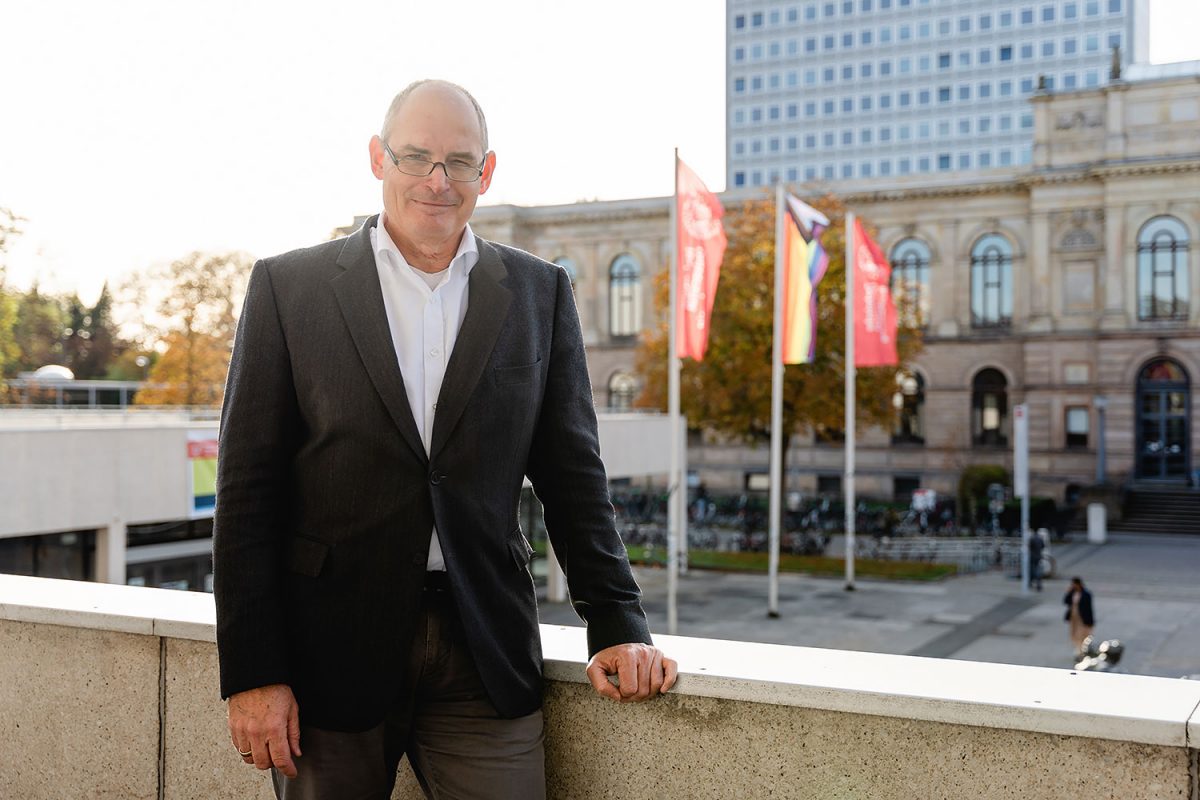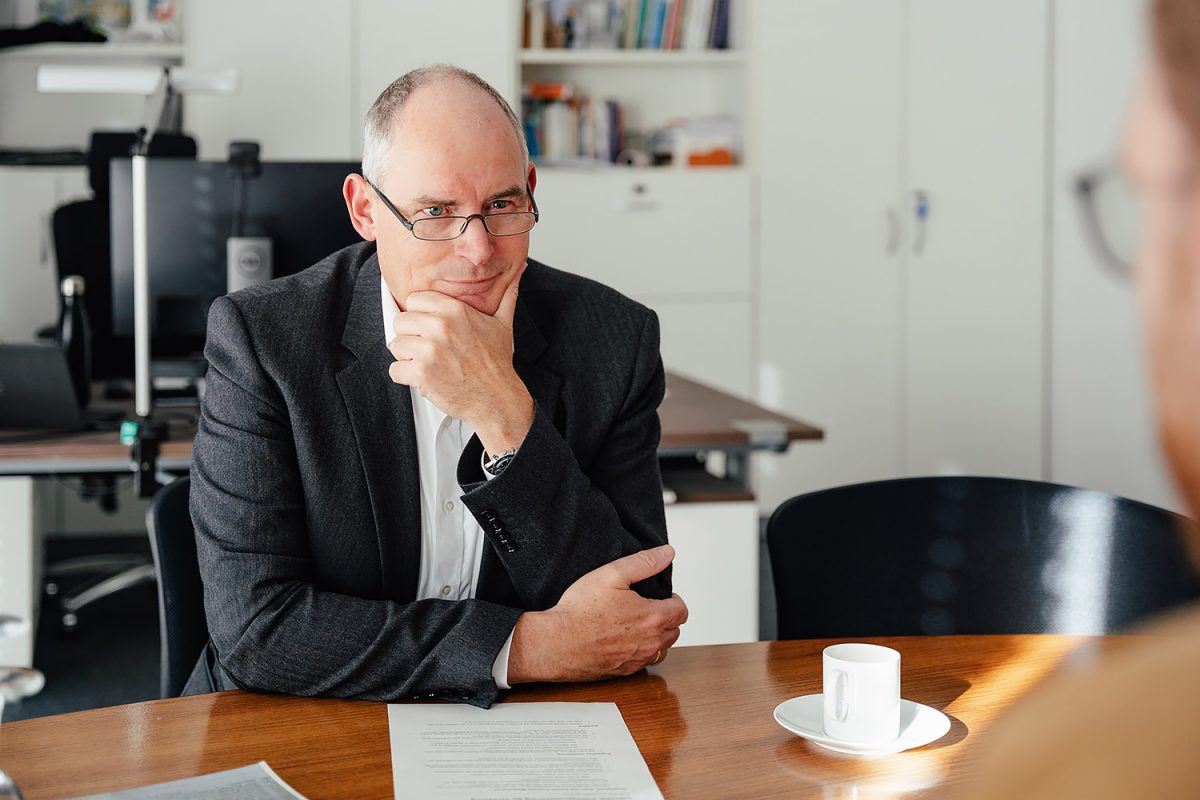“The administration is actively involved in shaping internationalisation” Interview with Vice President Dietmar Smyrek
Dietmar Smyrek has been full-time Vice President for Human Resources, Finance and Infrastructure at Technische Universität Braunschweig since 2010 and is therefore responsible for the management of the University’s administration. In this interview on the internationalisation of the administration, he talks about strategic considerations, challenges for employees and explains why being international does not end with being bilingual.
Mr Smyrek, let’s first look back: What were the first steps taken by TU Braunschweig to internationalise its administration?
Since 2016, there has been a strategy for the internationalisation of the administration at TU Braunschweig. We have set ourselves various goals, such as increasing the participation of our administrative staff in exchange programmes and stays abroad. We were able to quickly see results in this area, especially with our partner from Tampere. It is very important to me that, as part of this strategy, we as the administration are actively contributing to the internationalisation efforts of TU Braunschweig, because the administration to me is not just one that supports this process – we are actively involved in shaping internationalisation.
What role has the exchange between administrative bodies played in the development of the strategic cooperation with Tampere University?
Already at the time of first contact with the university management, the topic of administration set the tone. Together with academics, we sent a delegation and established first exchange formats. Today we have a strategic cooperation agreement, matching funds and engage in many other joint activities. I think it is unique that administration is put on an equal footing with academic cooperation and as such is firmly rooted in the cooperation agreement.

Vice President Dietmar Smyrek during the interview: “We need to meet the demands of many different stakeholders.”. Picture credits: Simone Fürst/TU Braunschweig
International cooperation is probably more expected in academia than in the administration of a university …
In this case, it went hand in hand from the very beginning and both sides complemented each other. This has given the partnership a special dimension and has also generated a lot of interest in Tampere. The cooperation at the administrative level is the perfect complement to the long-standing and successful cooperation in the field of research.
TU Braunschweig is currently going through the third audit process for the internationalisation of universities. Can you build on the existing ideas here?
Yes – for us the fact that we have developed a strategy for the internationalisation of the administration and are fully committed to it now opens up completely new room for manoeuvre. We are an integral part of the Re-Audit² process from the very beginning and therefore have the chance to help shape it. What has changed is that in the third audit process, we are not only considering the central university administration, but are also including administration at the faculty level, where colleagues can express their concerns. We have to take into account very different prerequisites here.
As full-time Vice President for Human Resources, Finance and Infrastructure, you are the head of the central administrative units. What is your personal motivation regarding the topic of internationalisation?
I myself worked for several years as Head of Administration of the non-profit foundation DNW Dutch-German Wind Tunnels in the Netherlands. During that time, I gained experience that I would not have been able to gain in the same way in Germany and that still helps me today. For me, internationalisation is not simply about offering all forms and services in two languages. It’s about culture. It’s about learning from others and broadening one’s own horizons.
If it’s not just about being bilingual, how does internationalisation affect the everyday work of employees at TU Braunschweig?
Being bilingual is important, but that’s just our duty. We also want to go the extra mile. Language affects many areas, from forms to email signatures to our Information Portal. Our ambition here is to close all the gaps as best we can. This task will continue to keep us busy for a while.
For everyday work, we have established contact persons in each division who can help, for example, if there are difficulties with the English language. In addition, we have massively expanded our personnel development programme. There are mobility opportunities for employees and there is a great willingness to improve language skills. In this context, we support our staff with, among other things, the newly created certificate for international competence. In the recruitment process, we now pay more attention to foreign language skills than we did in the past. All of this has a positive effect on an international, welcoming culture. We are also increasingly dealing with administrative issues in an international context, for example when it comes to handling projects with various international partners. With this in mind, we will continue to develop additional competencies. Internationalisation also concerns infrastructure – from digitisation under the heading of internationalisation and compatibility to the construction of a guest house.

Dietmar Smyrek points out: “It’s about broadening one’s own horizons”. Picture credits: Simone Fürst/TU Braunschweig
What are the possible hurdles from an employee’s point of view?
Some staff members are concerned that our internationalisation efforts will have a negative impact on their already high workload and that they will have to cope with additional tasks. But of course, no one has to start translating forms on their own. It is important to me to emphasise that we do not force anyone into language courses or to spend time abroad. We see it as our task to support our employees in a way that suits their interests and their work routines. In addition to language and mobility programmes, this is primarily about a cultural change that has to take place in people’s minds.
Let’s look ahead for a moment: Where do you see upcoming challenges in the internationalisation of administration?
Being a university, but also especially an administrative body, we must continue to deal intensively with the topic of internationalisation and in doing so meet the demands of many different stakeholders – both inside and outside of the TU. What is expected of us here is above all a matter of culture. But to make it possible, we have to establish the right framework conditions and structures. Only if we support our employees in these challenges will we continue to be an attractive employer in the future. At the moment, we are also concerned with the evaluation of our measures and the identification of best practices.
And what will an internationalised administration look like in 2030?
It will mean that all our employees live and breathe internationality and are enthusiastic about exchange with partners from all over the world. My vision is that everything international is a matter of course and that we do not differentiate between what is national and what is international. And because I can see every day how motivated and committed our colleagues are, I am convinced that this is what we will achieve.
Thank you very much for the interview!
The interview was conducted by Daniel Götjen/International House.
